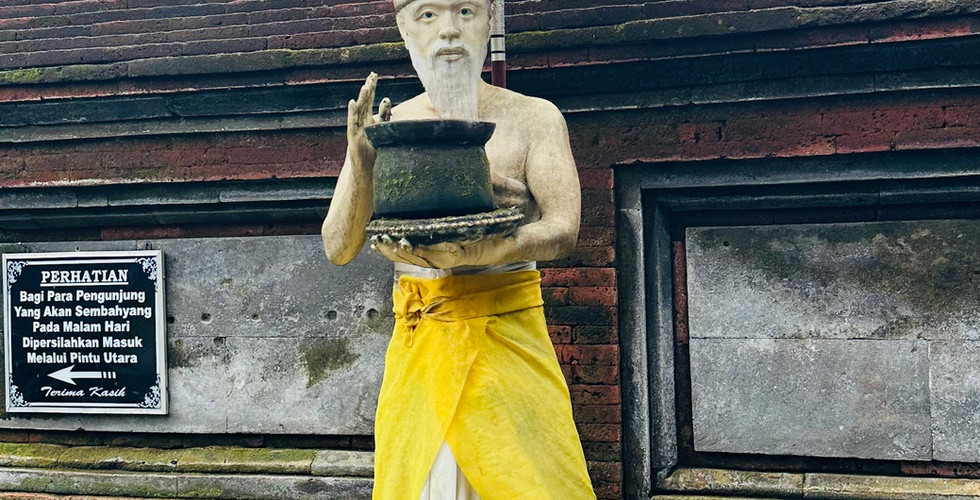Tirta Empul Temple: Cleansing the Soul in Bali’s Sacred Waters
- Binge Living
- Jun 15, 2025
- 3 min read
To be honest, Tirta Empul wasn’t even on my radar. Most tourist itineraries focus on trekking, café hopping, or beach parties—this place rarely gets mentioned. I had no clue about it either until the very end of our stay in Nusa Penida.

The evening before we were heading to Ubud, I found myself scrolling through TripAdvisor, just trying to figure out what else we could explore. That’s when I stumbled upon a comment someone had left about a temple known for its healing rituals and sacred waters. It instantly caught my attention. That was the first time I heard the name Tirta Empul, and something about it just stuck. From that moment, I knew—this was something I had to experience while in Ubud.
About Tirta Empul Temple:
Tirta Empul is a thousand-year-old Balinese Hindu temple located in the village of Manukaya, just outside Ubud. It’s best known for its holy spring water, which is believed to have powerful purifying and healing properties. The name "Tirta Empul" literally means “holy water spring” in Balinese.
Locals and visitors come here to take part in a traditional melukat—a purification ritual where you cleanse your mind, body, and soul by bathing under a series of sacred water spouts in the temple’s central pool. The atmosphere is deeply spiritual, yet welcoming to anyone with an open heart.
Entry Fee: 75000 IDR


The Purification Pools of Jaba Tengah:
At the center of Tirta Empul lies Jaba Tengah, the middle courtyard of the temple—and the heart of the holy water purification ritual. There are two large stone pools here, both fed by a natural spring. The first pool has 13 fountains, lined up neatly from left to right. This is where the ritual begins. People step in quietly, one by one, moving from spout to spout. Under each fountain, they bow their heads and let the water run over them—some pray, some weep, some just breathe deeply. You’re meant to dip under the water three times at each spout before moving on to the next. I didn’t know this before coming, but each spout has a different spiritual purpose—some are meant to clear away negative energy, others are for physical healing, clarity, peaceful sleep, or protection. However, the 11th and 12th fountains are specifically used for death rituals and should be skipped by most visitors.
Here’s a breakdown of what each of the first 13 fountains generally represents:
Spout Number | Name | Spiritual Purpose |
1 | Pancoran Tirta Empul | Cleansing the body and soul |
2 | Pancoran Tirta Penglukatan | Spiritual purification |
3 | Pancoran Tirta Sudamala | Healing negative energy |
4 | Pancoran Tirta Panegtegan | Courage and protection |
5–7 | -- | General well-being and washing away bad luck |
8–10 | -- | Health, longevity, peace of mind |
11–12 | Reserved for ceremonies related to the dead | |
13 | Final blessing | Completion of cleansing and setting new intentions |

Before entering the holy waters, you’re asked to wear a sarong and sash—these are either rented or provided at the entrance if you don’t have your own. Before entering the main courtyard, you are asked to leave an offering at the main temple shrine—usually a small tray with flowers, incense, and food, which you can buy just outside the temple gates.
Locker and Sarong: 35000 IDR

As I stood under those ancient stone spouts, eyes closed, water pouring over my head, something shifted. I didn’t understand the meaning of every ritual or fountain, but I didn’t need to. There was a quiet power in just being there—surrounded by strangers, yet united in a shared moment of cleansing, surrender, and hope.

For someone who practices Reiki and believes in the energy of healing, this felt like a personal gift from Bali. A pause. A reset. A space to let go of all the noise and just be still.
And just when I thought the experience had ended, we stepped outside the temple into one of the most beautiful local markets I’ve seen on the trip. Rows of vibrant kimonos, hand-stitched open pants, Buddha statues, marble-crafted keepsakes, and traditional Balinese trinkets—it was the perfect way to ground back into the world after such a soul-stirring ritual. Naturally, I didn’t walk away empty-handed!
Tirta Empul may not be on every itinerary, but maybe that’s what makes it even more special. If you’re open to it, this place has a way of finding you when you need it most.



















